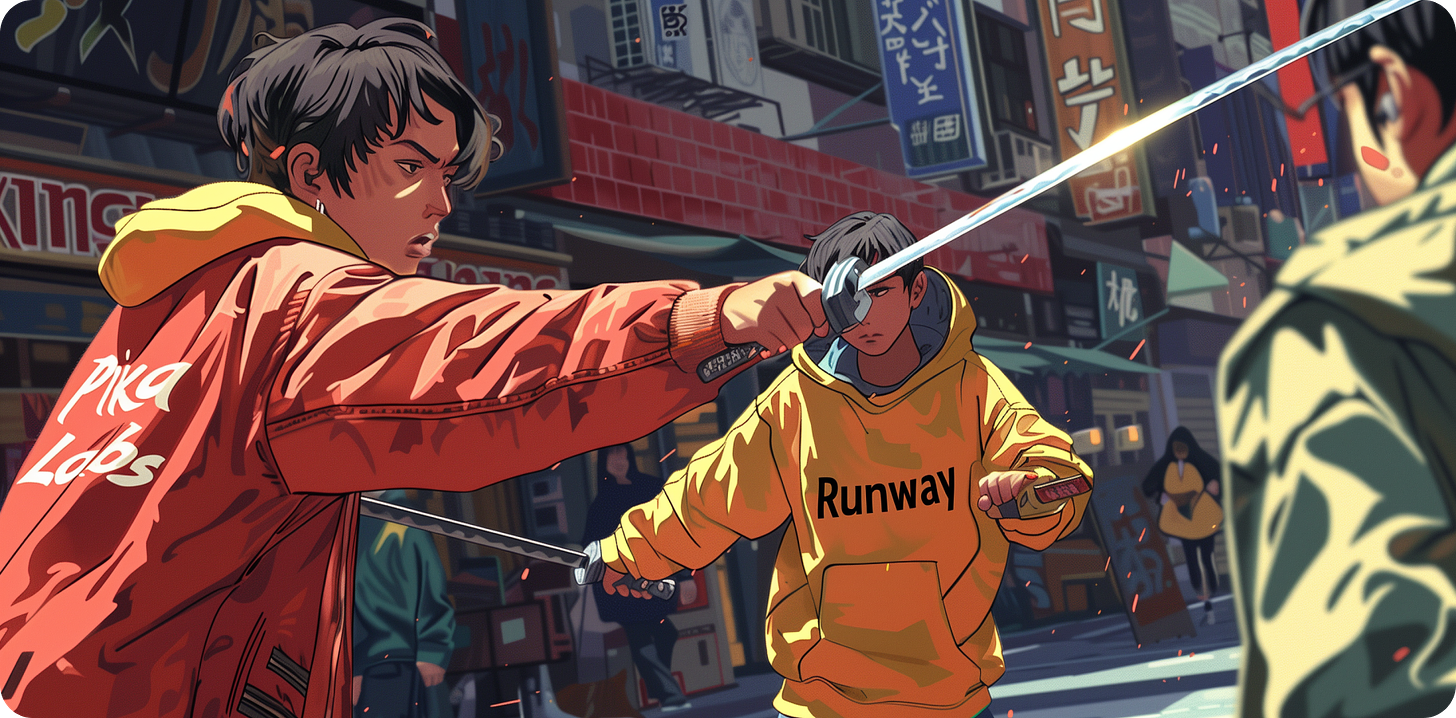In today’s edition:
Sakana AI goes fishing for Japan’s Big Banks with an expanded $200M Series A
Microsoft & KT (Korea Telecom) announce a $1.8B Partnership
China’s Kling AI is the world’s #1 Rated AI Video Model startup
10 New Startup Jobs & 6 New Startup Internships
More Asia Startup News
🔥 Sakana AI goes fishing for Japan’s Big Banks with an expanded Series A
The scoop: Last month, Sakana AI (which was recently awarded a large supercomputing grant from the Japanese government) has raised a $100 million Series A round led by a few of the top American VC firms: Khosla Ventures, Lux Capital, NEA, as well as small checks from many Japanese technology conglomerates.
But given that Sakana AI is arguably Japan's hottest startup, they decided to up the funding amount, expanding to $200 million thanks in part to Nvidia's Investment Arm. But more importantly, Japan's three largest banking groups are also joining the mix: Mitsubishi UFJ Financial Group, Sumitomo Mitsui Banking Corporation, and Mizuho Financial Group.
Fun facts:
Sakana AI creates foundation models including image generation, Japanese text generation, and recently a model that autonomously conducts scientific research
These banking partnerships give Sakana AI access to massive proprietary Japanese financial datasets - & data is still the lifeblood of AI model training
Not too long ago McKinsey & Company conducted a large-scale survey revealing that 52% of white-collar workers, in America, use ChatGPT every month. However, when compared to Japan, only 7% of white-collar workers said they use the product. Even more startling, 46% of Japanese respondents said they had never even heard of ChatGPT. So the opportunity for Sakana AI is massive
Sakana’s team is made up of: David Ha (Sakana’s CEO), previously an executive at Goldman Sachs Japan, and formerly a 6-year ML researcher at Google Brain. Ren Ito (Sakana’s COO), previously a member of the Japanese Prime Minister's cabinet, was formerly the CEO of the Japanese unicorn startup Mercari, and then lastly he was previously the COO of Stability AI. As well as Llion Jones (Sakana’s CTO), who was one of the eight co-creators of the Transformer Architecture.
Why it matters: Sakana AI & OpenAI are going head to head in a showdown on the streets of Tokyo. As OpenAI recently poached the head of AWS Japan and moved into this new international market, Sakana quickly responded, securing a war chest of cash. While OpenAI brings global brand recognition, Sakana's partnerships with Japan-based companies (including the major banks) provides critical local infrastructure and data access.
In Japan's relationship-driven business culture, Sakana's domestic roots and conglomerate ties could prove helpful, potentially boxing out OpenAI among particular customers. With Japan's AI market projected to grow from $7.5 billion in 2022 to $23.3 billion by 2027, the stakes are high, and Sakana AI's local connections might just give it the edge in becoming the big fish in Japan's AI pond.
💸 Microsoft & KT (Korea Telecom) announce a $1.8 Billion Partnership
The scoop: The two companies aim to develop a Korean-specific AI model together based on GPT-4o's architecture, which is a multimodal generative pre-trained transformer developed by Microsoft-backed OpenAI. This $1.8 Billion Partnership will go towards data centers, infrastructure, and most importantly foundation models.
Fun facts:
The CEO of KT recently stated that "Many companies claim they have Korean-style AI but it is all talk," during a recent press conference alongside Microsoft.
However, Korea does have foundation model startups: Upstage AI has raised well over $100 million + SK Networks, Naver, & Kakao (three of Korea's largest technology companies have dedicated 50+ person, model development teams)
KT is going on the offense with AI. As just one example, they recently led a $200 million funding round into an AI inference chip startup called Rebellions - alongside Temasek, and the Korea Development Bank.
Why it matters: Korea offers a highly lucrative market with consumer spending power that ranks among the highest in Asia, averaging over $17,000 per capita annually. For Microsoft and OpenAI, as growth slows in the U.S., expanding into Korea provides a strategic pathway to tap into fresh demand and secure a foothold in an influential, tech-savvy region.
🧠 China’s Kling AI is the world’s most popular AI video model
The scoop: Kling is an AI video creation platform that’s a part of a China company called Kuaishou Technology. It’s a $30 billion dollar valuation powerhouse, and their product Kling AI had over 17 million website visits last month alone. Also, recent consumer research from Bain & Co ranks Kling's model quality above Stability AI’s Video Diffusion, Pika 1.5, and Runway Gen3, based on a survey of 4,800 individuals.
Fun facts:
Kling’s video model generates clips up to 2 minutes long at 1080p resolution
Their secret sauce is a specialized 3D Variational Autoencoder (VAE) for realistic face and body reconstruction, paired with a 3D spatiotemporal joint attention mechanism to handle complex scenes while maintaining physical accuracy.
Their training data allegedly came from a combination of 5 major video platforms: Kuaishou, Douyin, YouTube, Bilibil, and Sina Weibo
The only other real Chinese contender is MiniMax with Hailuo, a $3 billion Chinese unicorn backed by Alibaba & Hongshan (Sequoia China)
Bull case: Kling AI is best positioned to capture a significant share of China’s rapidly growing video content market. And its ability to produce 1080p videos from simple prompts can be interwoven into the parent company’s app Kuaishou, with its 400 million DAUs, who collectively consume over 1.5 billion short videos daily.
Bear case: As AI video generation technology moves from trade secrets to open-source, with diminishing information moats, the barriers to entry are dropping. And this shift could allow well-funded platforms to enter the space rapidly. For example, Canva, with 135 million monthly active users, and CapCut, favored by over 1 billion TikTok users, are well-positioned to develop best-in-class AI video models tailored for their application layer products. These platforms already have significant user bases and can seamlessly integrate AI capabilities, potentially squeezing Kling out.
ByteDance has released $170 dollar AI-equipped wireless earbuds into the Chinese market. The earbuds enable users to talk to the company’s artificial intelligence chatbot, Doubao, without looking at their phones. The product looks similar to Apple’s AirPods but with a twist - now with your very own AI companion, à la the movie "Her".
OpenAI sets its sights on Singapore, announcing a new HQ and plans to bring 20 fresh faces on board by the end of 2024. This includes team members from solutions engineering, customer success, and a head of sales.
Baidu enters the robotaxi race with Apollo Go, in an effort to keep up with Tesla & Waymo’s autonomous ride-sharing services, while also competing against local rivals like Pony AI, AutoX, and DiDi Autonomous Driving in China’s rapidly growing market.
Linear, Korea's rising star in consumer AI search with 10 million users, secures an impressive $20 million of Series A funding to fuel its growth. The cash-pile coming from Samsung Ventures, Industrial Bank of Korea, and many other Seoul-based firms.
Temu hits a roadblock in Indonesia as the government shows it the door, asking Google and Apple to remove the iOS & Android application from their respective app stores in a bid to protect local businesses.
Hyundai revs up innovation in Seoul, partnering with 20 Korean financial firms to launch a startup demo day program that's drawing comparisons to Y Combinator.
Full-Time Opportunities
🇸🇬 • 📚 Reka AI, Singapore - Data Engineer
🇸🇬 • 🤖 OpenAI, Singapore - Customer Success Manager
🇸🇬 • 🌐 StashAway, Singapore - Head of Marketing
🇸🇬 • 💼 Eko, Singapore - Technical Program Manager
🇸🇬 • 🍌 Funding Societies, Singapore - Data Scientist
🇸🇬 • 🧪 Carro, Singapore - Operations Associate
🇯🇵 • 🧠 Sakana AI, Japan - Computing Platform Engineer
🇯🇵 • 📈 Tier IV, Japan - Frontend Engineer
🇰🇷 • 🚀 Upstage AI, Korea - Research Engineer
🇰🇷 • 🔬 Rebellions, Korea - Technical Recruiter
Internship Opportunities
🇸🇬 • 📈 Tencent, Singapore - Product Manager Intern
🇸🇬 • 📝 Carousell Group, Singapore - Media Strategy Intern
🇸🇬 • 🤖 Zenyum, Singapore - Operations Intern
🇸🇬 • 📊 Dyson, Singapore - Design Engineering Intern
🇯🇵 • 📣 Mercari, Japan - Product Manager Intern
🇰🇷 • 💻 Twelve Labs, Korea - Research Intern











